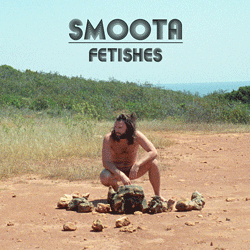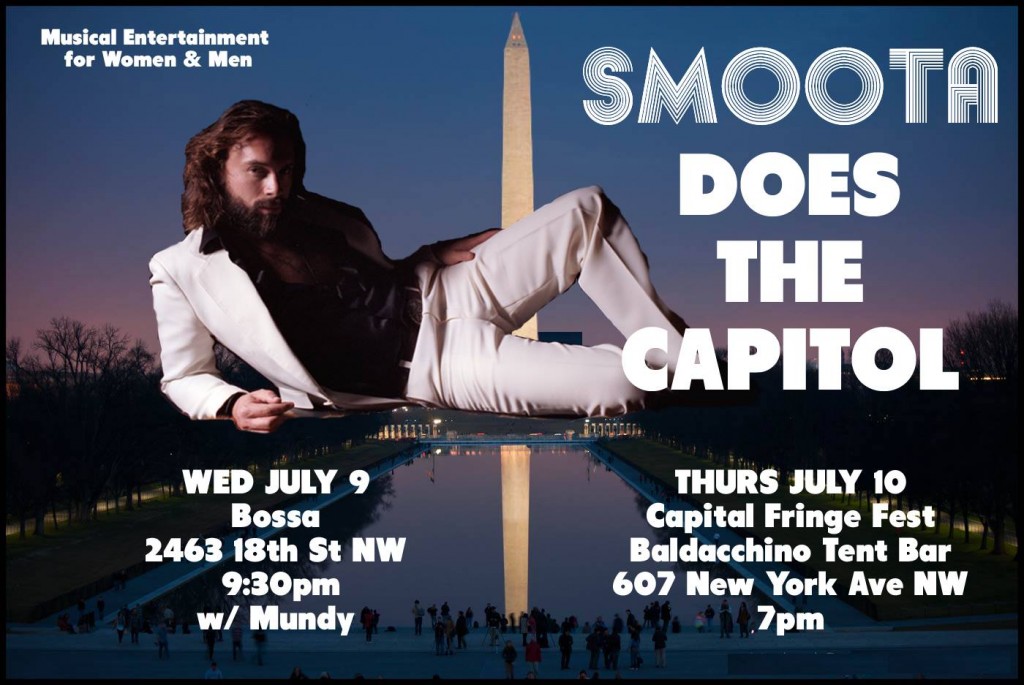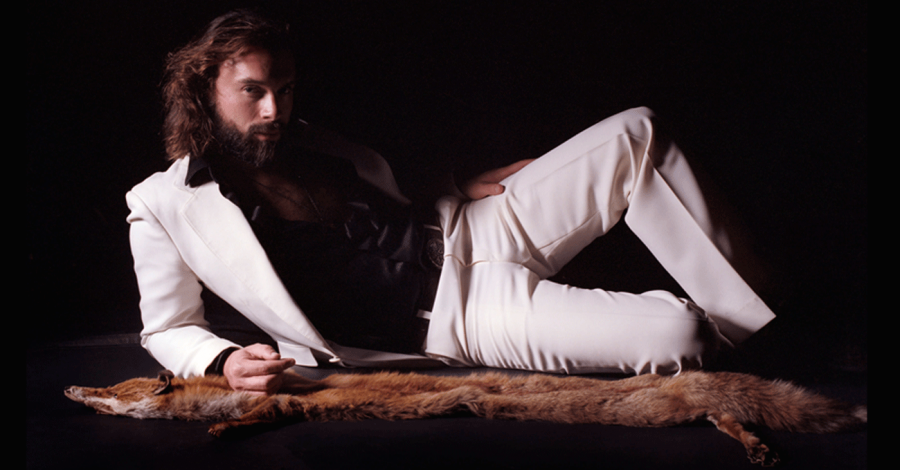By now, it’s a tired truth in pop culture: Male nudity is considered funny, not erotic. When we see it—in certain contexts, anyway—we tend to giggle. But pro-nudity musician and performer Dave “SMOOTA” Smith would like to change that.
Smith has played trombone professionally for years—with acts like TV On The Radio, Spoon and Sufjan Stevens—but when he found himself ready to go solo, he devised SMOOTA. Smith says SMOOTA is his way of “exploring male sexuality and desire through music.” His jazz-funk hybrid songs like “Pink Bra Playing Guitar” and “I’m Sorry” mix brazenly sensual sounds with lyrics that verge on the explicit, but remain mostly within PG-13 territory. He released his debut album, Fetishes, in October.
This week, SMOOTA cruises through D.C. to perform two live shows: one at Bossa Wednesday and another at Capital Fringe on Thursday. Despite what you might gather from his ’70s porno-tinged outfits and website, Smith comes across as achingly earnest in a recent conversation with Bandwidth. We spoke with the artist about his stance on nudity in music videos, authentic eroticism and—of course—the trombone’s overlooked sex appeal.
 Bandwidth: So your album is about male sexuality—what is there left to learn? What can this album teach us?
Bandwidth: So your album is about male sexuality—what is there left to learn? What can this album teach us?
SMOOTA: Well, I don’t know if there’s anything to learn from it as much as—I just think that those ideas are worth exploring in music, and they’re things that get talked about in movies and books a lot, and that’s a more acceptable place to talk about those things. There’s not a lot of music that deals with sexuality in a way that isn’t just either very shallow or funny or simple, and I wanted to see if I could put more complicated ideas about sex and desire and things that like into just the pop song. That’s where the idea came from.
What movies and books inspired you?
I studied film when I was in college, and I have watched a zillion movies—and in particular, a lot of European movies from the late ‘50s, ‘60s and ‘70s. They deal with sex very casually—not just that the sex is casual, but using sex as an element of real life, whereas American movies, the sex scene is usually the sex scene and doesn’t feel as much a natural part of the story.
Those European movies at that time—when they were just trying to get as real as they could—they were using sex as almost like a backdrop to real life and how two characters interact in the bedroom as a way to reveal character. … I just think this idea that the erotic is a part of regular life—which it is—and dealing with it that way, as opposed to this sordid thing that’s supposed to be the exciting moment in a book or a movie.
Warning: This song contains “adult themes.”
Do you find people interpreting you in a straightforward way, or do they think it’s funny?
It’s a bit of everything it seems, because there’s definitely an element of humor to music—not the music, but the lyrics—because I do find sex is often slightly comedic and I think it shouldn’t be treated overly seriously. So I have that element in the songs, and I like to have some humor in the songs. But the music’s very real. It’s not the music that’s funny.
People aren’t always used to seeing sex portrayed this way onstage, especially from a man. And so I think there’s always a little initial awkwardness about what’s going on, but by the end of the show or by the middle of the show, usually I feel like the room relaxes and everybody can get into it.
 You’re a trained trombonist. When you think of “sexy” instruments, trombone’s not really the first thing that comes to mind. Do you think you’re molding the image of the trombone?
You’re a trained trombonist. When you think of “sexy” instruments, trombone’s not really the first thing that comes to mind. Do you think you’re molding the image of the trombone?
I’m definitely molding it, I think, because most people think it’s not a very sexy instrument just because it’s such a blunt instrument. Because of the physics of it—it is a very smooth device. There’s a lot of visual motion to it. So people have said to me after shows that they didn’t realize that it could be like that. So I like that something’s changing around the trombone.
One of the interesting details of the trombone—it’s like the cello. The range of the trombone is the essential range of the human voice, so there is something human in the trombone unlike say, the trumpet, which is higher than most people speak or sing, or baritone saxophone or something. So there’s some kind of human connection to that like there is the cello.
What can someone expect from seeing SMOOTA live?
Well, it’s very intimate and direct. There’s a kind of a touch of performance art, because I am alone on stage, and it’s music that’s not party music. It’s definitely groovy music. My tempos are pretty slow, and so you kind of have to deal with what’s going on onstage, it’s not just a show that you go and party at, per se. I like that, because I definitely feel the audience every time. The energy in the room is changing throughout the show.
You’re largely nude in your music videos. Is that an awkward experience for you?
Well, I am a fan of not wearing too much clothing if not necessary. I’m not a nudist or anything. Part of it is just, I feel like when women are presented sexually in videos, that’s often how they’re presented—and I kind of like the idea of evening the playing field in that regard. A lot of people have a man be clothed, with naked women dancing around him, like that video for [Robin Thicke’s] “Blurred Lines.” That’s not using the right message about real sexuality. I kind of like the idea of stripping the clothing away on the man as well. For these videos, that just seemed appropriate. I don’t think that will always be the case, but you never know.

Do you get a sense that people are printing out your pin-ups? Do you ever get asked to sign them?
You know, no. I don’t know, actually. I did have to print one out for a friend’s birthday in Australia. She asked me to make a copy of that photo and I did sign that, so maybe one time.
Would you like to see more of that?
I would love to see a lot more of that, yes.



Pingback: Arts Roundup: Paint-Over Edition - Arts Desk()
Pingback: District Line Daily: D.C.’s Biking Twits - City Desk()